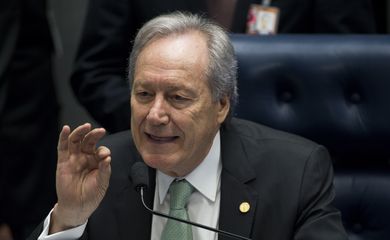Rousseff makes final appeal to senators to vote with their conscience


Rousseff noted that political disputes are natural, but impeachment would be no good for Brazil's democratic process.

Brazil's suspended President Dilma Rousseff concluded her speech during her impeachment examination at Senate urging senators to vote with their “conscience”. She maintained she had committed no impeachable crime and that if she were to be removed from office, it would leave the country a wound that would be “hard to heal”.
Rousseff noted that political disputes are natural, but impeachment would be no good for Brazil's democratic process. “Trying to make up impeachable crimes out of nothing and turn government budget and execution into an ideological battleground is no help for the country. I believe we are mature enough to overcome this case,” she said.
For Rousseff, the country must be mature to look for a solution to the crisis regardless of party leanings and “not make up non-existent problems, but address existing ones.”

Rousseff's examination was watched by distinguished guests, including former president Luiz Inácio Lula da Silva and music legend Chico Buarque.
Long hours of examination
The fourth day of Rousseff's impeachment trial lasted nearly 15 hours, beginning with the defendant's 45-minute address, when Rousseff said she was not fighting to stay in office, but for “democracy, truth, and justice.” According to Rousseff, a guilty verdict would be the “culmination of a serious institutional disruption, we'd be close to sealing a real coup d'État,” she said. She called the government of acting President Michel Temer a “usurper” and said that should he be confirmed to serve out the end of her term, it would be tantamount to an “indirect election”.
After her opening statement, Rousseff answered questions from 48 senators with mixed stances on impeachment, an examination that continued until midnight and was watched by distinguished guests of the suspended president, including former president Luiz Inácio Lula da Silva, music legend Chico Buarque, and some of the former members of Rousseff's cabinet.
Counting votes
In order to permanently remove President Rousseff from office, at least 54 out of a total 81 senators are required to impeach her. Senator Aloysio Nunes, the interim government's leader in Senate, said at least 60 votes for impeachment could be expected. A political prisoner during Brazil's coup-backed military dictatorship himself, he admitted Rousseff had done well and “argued her points boldly,” but he did not believe it would change the senators' minds. “I think the senators have formed strong convictions by now, so there's hardly any room for changes,” he said.
But for Rousseff's allies, the president has done a good job of presenting her arguments and succeeded in demonstrating that she has no impeachable liabilities. “The president was very firm, she answered all the questions, showed that she has a sound understanding of Brazil and its problems, and disproved the allegations of impeachable crime. (...) She was really brave,” said Senator Gleisi Hoffmann.
She is among those who believe some of the senators can still be persuaded to vote favorably to Rousseff. “I believe the senators who were still indecisive and had not declared their position could still cast a vote against impeachment. (...) We can hope for surprises tomorrow,” she said.
Final steps
The trial resumes on Tuesday (30) with the arguments of the prosecution and the defense. Then, the senators who yielded floor time will be called one by one to speak for up to ten minutes. More than 60 senators have signed up. Following the senators' speeches, Chief Supreme Court Justice Ricardo Lewandowski, who presides over the trial, should give a run-down of the main points of the prosecution and the defense. Only then will the final vote on impeachment take place.
It has been estimated that a verdict could be reached in the early hours of Wednesday (31), with the final vote of the 81 senators.
Translated by Mayra Borges
Fonte: Rousseff makes final appeal to senators to vote with their conscience




